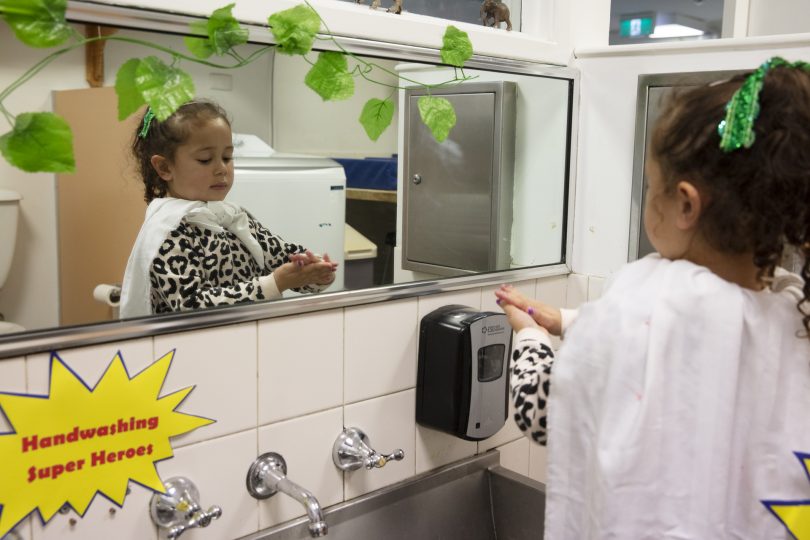
Children are being encouraged to continue good hygiene practices as gastro outbreaks in childcare centres spike. Photo: Supplied.
Gastroenteritis outbreaks in childcare centres have almost tripled in the last year, prompting ACT Health to warn Canberrans about health complacency.
ACT Health was made aware of 57 gastro outbreaks in the first four months of this year, a considerable jump compared to the average of 21 outbreaks during the same period over the past five years.
Children in childcare usually get infected when unwashed hands are placed directly in their mouths or touch food or drinks, ACT Health says.
Canberrans are being urged to keep living with the good hygiene practices we adopted during the COVID-19 pandemic, which resulted in a considerable drop in other viruses and infections last year. This included a drop in recorded cases of the flu in the ACT from 4000 in 2019 to only 200 last year.
Australian Medical Association ACT president Dr Antonio Di Dio said this was mainly due to social distancing measures and a greater emphasis on hygienic practices during the pandemic.

Health Minister Rachel Stephen-Smith has encouraged families to continue with hygienic practices. Photo: Dominic Giannini.
Health Minister Rachel Stephen-Smith said the outbreaks highlighted how important it was to continue good hygiene practices.
“Childcare centres tend to be incubators of these kind of things, and when something does happen, it tends to be a bit of a spike,” she said.
“But it is a reminder for people that the same precautions we used against COVID-19, particularly washing your hands properly with soap and water, are the best defence against many of these [outbreaks].”
Children are not supposed to go back to childcare until they have been free of gastro symptoms for 48-hours.
The main treatment for children who have gastro is to keep drinking fluids to replace what is lost from vomiting and diarrhoea. According to ACT Health, oral rehydration fluids like Gastrolyte, HYDRAlyte, Pedialyte and Repalyte can be used to replace fluids and body salts.
There was also a marked increase in Respiratory Syncytial Virus (RSV) at the end of last year with more than 400 confirmed cases, mostly in children under five.
It was more than 10 times the average for that time of year.
RSV causes respiratory infections and can cause ear infections as well. Symptoms include fever, cough, runny nose and wheezing.
Information about gastroenteritis can be found on the ACT Health website.
Information about Respiratory Syncytial Virus can be found on the healthdirect website.
Original Article published by Dominic Giannini on The RiotACT.





